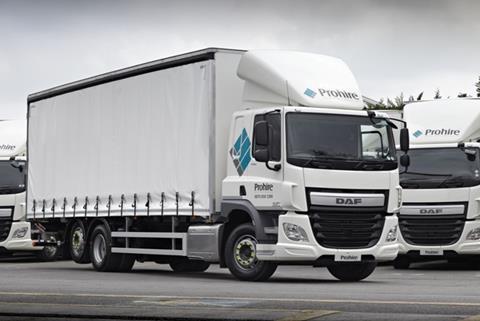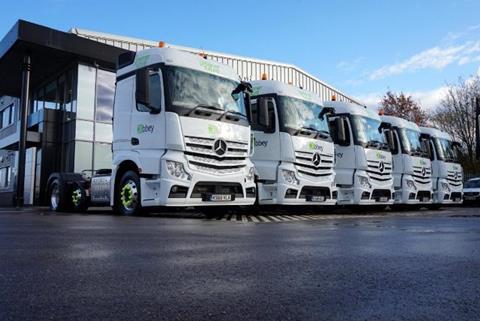
Established in 1997, Prohire has enjoyed continuous growth from both existing and new business over the last 22 years, offering a full range of contract hire, rental and fleet management services for vehicles from car-derived vans to 44-tonne tractor units.
It has not let the uncertainties surrounding Brexit stop its investment programme in both infrastructure and rental vehicles, and it will retire the last of its Euro-5 vehicles out of its rental fleet this financial year. Its contract hire vehicles are however more specialist in nature as sales director Andrew Morley explains.
“On the contract hire side we have customers with some very specialist assets,” he says. “You're talking vehicles worth up to £250,000 and that's where we are different to the volume rental and contract providers. We have a very solid reputation for supplying and supporting assets like mobile shredders, specialist temperature control vehicles and bespoke compaction units and trailers where vehicle compliance and uptime really comes to the fore as downtime costs money.
“Because of the value of some of these vehicles and given that they are straddling Euro-5 and Euro-6 at the moment we have worked with our customers to move the vehicles away from the London area post the introduction of the ULEZ.”

The rising demand for recycling and the rigour around the temperature control supply-chain means business at several of Prohire’s customers is booming and it is growing with them.
“One of those companies has recently ordered 13 vehicles worth over £200,000 each,” says Morley. “They're going to run the existing Euro-5 vehicles in the rest of the country until they can be viably phased out and put the 13 new vehicles into the London area because their business is continuing to grow.”
The Prohire owned fleet now stands at circa 3,000 ambient and temperature-controlled vehicles, 55% of which are HGVs and the balance being LCVs on fleet, compliance and accident management.
“We've done extremely well over the years in securing new business,” says Morley. “When I first joined the business some 11 years ago the fleet was around 1,400 vehicles which has more than doubled in size by delivering on our promises and increasingly increasing our share of many of our customers' fleets so much so that we have ‘sole supplier’ status with a number of our key customers some of whom we have worked with for over 10 years.
“The plan going forward is both continuing the organic growth and looking at other ways to grow the business. The last acquisition we made was Sunrent in 2016 which has integrated really well into business and given us an even greater share of the temperature-controlled sector.
“Our independence means that we still very much maintain a consultative approach to our customers which is something that is really embedded within our sales approach. This is because it's all about whole life costs which includes the uptime and reliability of the vehicles.”

Operations director Paul Hassall takes up the story.
“The biggest driver for the team at Prohire when they're evaluating the best vehicle for us to provide is as Andrew says very much about product reliability and, of equal importance, the support that the manufacturers provide. Some manufacturers are pretty rigid whilst others continue to be supportive well beyond the standard warranty period.”
With around 15% of its vehicles based in and around London, more of Prohire’s customers are specifying vehicles that comply with the FORS silver standard with the aim of being ready for the Direct Vision Standard (DVS) and therefore having unencumbered access to the capital when the standard comes into force in October 2020.
Of course, operators will also need a safety permit and adhere to the recommended driver training standards all of which comes at a cost to the operator whichever vehicle acquisition route they choose to take. London operators also need to be wary about the potential of a zero emissions zones coming into the capital that could make even Euro-6 diesels obsolete in years to come.
“Clearly there's a lot of discussion around electric and hybrid vehicles,” says Morley. “The problem is that with the payload requirements that our customers are handling you could be talking of possibly doubling the number of trips to move the same payload. So, in effect you would see an increase in vehicles in urban areas and although the environment may benefit from this in terms of less pollution, we will more than likely see more congestion on the roads as well as potential driver shortages.”

Hassall continues: “We are looking to advise our customers on alternative fuel vehicle solutions but when they have a site with say twenty 3.5 tonners and twenty 7.5 tonners the challenge will be having the appropriate power supply to charge the vehicles. The infrastructure currently just isn’t there, so we are looking to help our customers to be ahead of the game by future proofing new distribution sites to accommodate this future challenge.”
Back to business as usual after Brexit delays
Although Brexit has caused a "degree of nervousness and uncertainty" in the main it has been more or less been business as usual with Prohire's customers determined not to be affected by this issue, Morley says.
“We have extended some customers vehicles through this period of uncertainty, but certainly not en masse by any means," he says. "Our new business and renewal order book are as good as ever. However, if we have customers with vehicles that have completed their primary term and the mileage is still sensible, we will agree to extend the vehicles on a contracted basis to ensure they are compliant at all times.”
Both Morley and Hassall portray a good degree of confidence surrounding the future of the contract hire and rental industry but urge competitors, manufacturers and operators alike to understand the demands being placed upon the entire supply chain so that it remains stable, safe and compliant.














